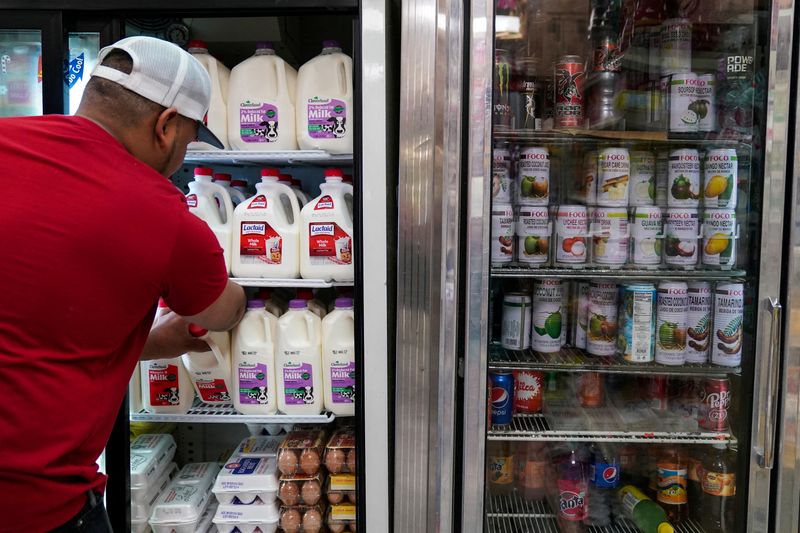By Howard Schneider
WASHINGTON (Reuters) - If the deep split in U.S. politics makes characterizations of economic data a dependable tell about party affiliation, the coming Republican and Democratic conventions will put that phenomenon on steroids, amp it to 11, and leave little room for shades of gray.
Republicans want things to seem bad and stoke sentiment against the incumbent Democratic party.
Democrats want people to forget about the hardship high food and housing costs have caused on their watch, and put sticker shock in the context of rising wages or, on the blame side, corporate profits.
As the two parties make their case and nominate their candidates for the Nov. 5 presidential vote, here are some of the things the Republicans aren't likely to mention at their convention, and a few things the Democrats would prefer people ignore during theirs:
INFLATION IS YESTERDAY'S NEWS
The Federal Reserve won't say it yet, but the spike in prices that started in mid-2021 has largely subsided, inflation is approaching the central bank's 2% targeted rate, and there are factors lining up that are likely to pull inflation lower.
ABOUT THOSE CEREAL PRICES
At a July 9 hearing with Fed Chair Jerome Powell, Republican Senator Steve Daines read off his shopping list of inflation complaints, including that cereal prices had jumped more than 25% under Biden.
That is true.
He could also have said they have not increased at all over the past year. Food prices overall have followed the same pattern, a punishing level shift of about 20% from 2021 through 2023 and little change since. As with much economic data, it matters when you start the clock, and how you decide what's the trend and what's the outlier.
SHOPPING FOR A USED CAR?
Prices have fallen about 16% for used vehicles since February 2022, and they are edging lower for new cars also.
After gummed-up computer chip and other supply chain problems caused goods prices to surge beginning in mid-2020 - when COVID lockdowns and fiscal transfers led to blowout spending on tangible stuff since services like dining out and travel weren't accessible - prices for goods are now behaving about how they did before the pandemic, staying roughly stable or even falling a bit.
PEOPLE GOT BY
When asked why people seem so soured on the economy, Powell has often said that even if price jumps are hard to swallow, people were still spending money on trips and concerts and restaurants in a way that seemed inconsistent with a narrative of struggling households.
Data from the Census Bureau's Household Pulse Survey in fact shows an increase in households saying they found it "somewhat" or "very" difficult to pay their expenses around the time inflation peaked in 2021. But the national average has since come down to below where it was before the inflation surge.
In the Fed's 2023 Survey of Household Economics and Decisionmaking, the share of those saying they were doing "at least okay" remained over 70%, lower than the 78% peak hit in 2021, but roughly where it was before the pandemic. By contrast, a dismal 22% rated the national economy "good" or "excellent," a split between perceptions about personal conditions and national ones that has flummoxed many economists.
DEMOCRATS BEWARE: PRICES DON'T FALL
If the GOP will be stingy in acknowledging any improvement in inflation, Democrats will try to downplay what two years of rapid price increases have meant to people and how long it may take for memories to fade.
Though prices of individual goods or services may fall, the price level - the more general concept economists have in mind when they talk of inflation - rarely goes down. Once price level jumps occur, like the one just experienced, life stays more expensive. A cup of coffee is never going to cost a nickel again, or even $2.
REAL WAGES DO
It is a standard talking point for Democrats that price increases should be viewed in relation to the rapid wage increases seen particularly for lower-paid jobs that were hard to fill in the pandemic's wake.
But the purchasing power of wages did take a hit, even if the lingering impact of some pandemic-era transfer programs masked it.
At the point where inflation hit its peak in the summer of 2022, prices had gone up 12% since January 2021 while average hourly wages had gone up around 8%.
The gap has narrowed since then, and for workers on production lines or in non-management jobs the spending power of the average wage is about where it was.
But that amounts to years of treading water, not getting ahead, and overall hourly wages still lag.
LOW BLACK UNEMPLOYMENT; WIDE WEALTH GAP
The tight labor market exiting from the pandemic did, as the Biden administration points out, help narrow the unemployment gap between Black and white workers, and boosted incomes for Black families.
But a New York Fed study that looked beyond income to household wealth, and adjusted it for inflation, found that one of the Democratic Party's core constituencies had in fact gone backwards in terms of net worth.
It wasn't just a matter of not keeping pace. Black household wealth was, once adjusted for inflation, actually lower as of the third quarter of 2023 than it was at the start of 2019.

HOUSING WAS AND IS A SHOCK
How the U.S. ended up with a housing shortage is a story that starts at least as far back as the collapse of the housing market in 2006-2007. Add to that the tightening of zoning laws in many states and cities, people moving house during the work-at-home days of the pandemic, the impact of high mortgage rates, perhaps even immigration in some markets, and the result is a run-up in rents and prices that may have gelled as a political issue on the Democrats' watch. The fact that housing inflation has shown a glimmer of slowing may not be enough to soothe voters as election day approaches.